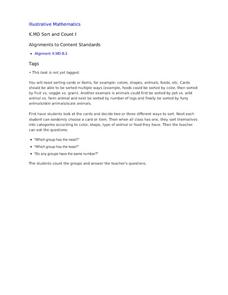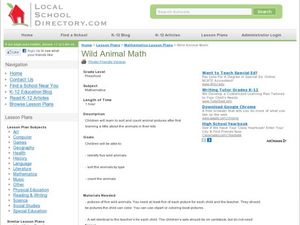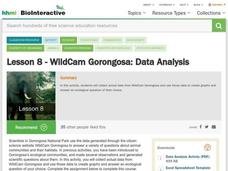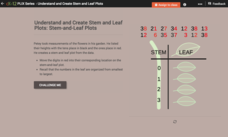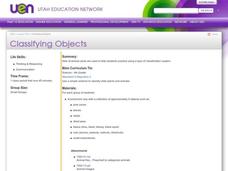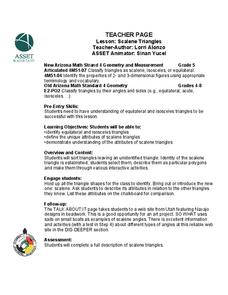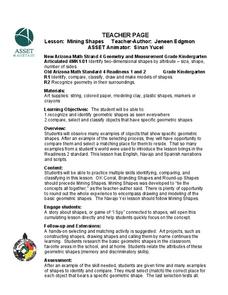Illustrative Mathematics
Sort and Count
Young mathematicians are on their feet and moving around in this primary grade sorting activity. After giving each child an object or picture card, they then sort themselves into groups, counting to see which has the most or least...
Heidi Songs
Zoo Animal Probability Graph
Capture the engagement of your young mathematicians with a collaborative graphing activity. Using a deck of zoo animal picture cards, students select a picture from the deck, record the chosen animal on a graph,...
Curated OER
Sorting the Animals
Does a fish have four legs? Of course not! Youngsters practice their counting (and animal attributes) skills as they determine which of each set of animals has a specified number of legs. They circle animals with four, six, two, and zero...
Curated OER
Wild Animal Math
Students examine wild animals. In this sorting and counting lesson, students are introduced to animals by viewing pictures. Students discuss the sounds they make, where they live and what they eat. Students pretend to be the animals....
Curated OER
Classifying Objects into Group
Classifying and sorting are great skills all kids need to know. They cut out each of the six images provided, then label each of two boxes. They glue the images in the appropriate box. Answers are provided.
Howard Hughes Medical Institute
Lesson 8: WildCam Gorongosa Data Analysis
How do scientists analyze data to get a specific answer to a question? The final chapter in an eight-part series of activities centered around Gorongosa National Park encourages scholars to dig deeper into the scientific process. After...
CK-12 Foundation
Understand and Create Stem-and-Leaf Plots: Stem-and-Leaf Plots
Explore the advantages to using a stem-and-leaf plot using an online lesson. Learners manipulate an animation to create a stem-and-leaf plot. They then calculate statistics for the data using their display. Guiding questions help them...
Curated OER
Classifying Objects
Fourth graders work in small groups to sort and classify a variety of objects. They develop criteria for sorting and explain the characteristics they chose for classification. Groups record and share their classifications.
Curated OER
Scalene Triangles
Fifth graders identify and classify scalene, equilateral, and isosceles triangles. In this triangle lesson, 5th graders define the different attributes of 3 types of triangles and sort them by descriptions and...
Scholastic
Study Jams! Order of Operations
Please excuse my dear Aunt Sally! Sort of like an animated slide show, this lesson walks fifth graders through the order of operations. Also included are a sing-along karaoke video, key vocabulary with definitions, and a seven-question...
EngageNY
Interpreting the Graph of a Function
Groups sort through NASA data provided in a graphic to create a graph using uniform units and intervals. Individuals then make connections to the increasing, decreasing, and constant intervals of the graph and relate these...
Curated OER
The Grouchy Ladybug
Young scholars learn about sorting and classifying objects by size while reading Eric Carle's "The Grouchy Ladybug". In this sorting and classifying lesson, students first listen to and interact with the story. They then look at cut-outs...
Curated OER
Small and Large Squares
Young mathematicians classify squares according to attributes. They sort squares according to specific attributes. Students explore squares in repeating patterns and order squares according to size. Engaging extension activities are...
Arizona State University
Mining Shapes
Youngsters recognize and identify shapes. They draw, and use modeling clay to make shapes. They also identify shapes in their environment and in the Navajo culture, then compare the shapes and sort them into groups. This is the...
Curated OER
Animal Parade
In this problem solving learning exercise, students compare the weights of 6 animals. Students solve 4 story problems pertaining to the information provided.
Curated OER
Shell Sort; Serving up Seafood
Students complete various small group activities to classify items and determine the types of combinations that can be made with these items. In the second lesson, students create menus for a restaurant to help them gain money sense and...
Curated OER
Make a Leaf Banner
Students create leaf print banner for parents' night. They sort, classify, and pattern the leaves as they work.
Curated OER
Shapes
Students identify attributes of different geometric shapes. In this geometry lesson, students view a PowerPoint presentation on shapes and use attribute blocks to examine the corners and edges of each shape. Students work together...
Alabama Learning Exchange
The Grouchy Ladybug
Learners listen to the book, "The Grouchy Ladybug" by Eric Carle and sequence the events in the story. Using a graph, they draw and color the animals that the ladybug meets next to the corresponding time from the story, and conduct...
Curated OER
Agriculture Counts
Students discuss the kinds of things they count and how to use tally marks. In this social science lesson, students count animal crackers by using tally marks for each kind of animal. The tally marks are changed into numbers and one...
Curated OER
2-D and 3-D Presents at Pedro's Party
Fifth graders draw 2-D and 3-D shapes. They sketch and label geometric figures with correct terminology, then explore parallel and perpendicular lines. Pupils sort and classify shapes drawn.
Curated OER
Pancakes, Anyone?
First graders explore data collecting and graphing. In this data collecting and graping instructional activity, 1st graders watch a video about monster who sells pancakes. Students make a graph to record the most popular pancake....
Curated OER
What is an Animal Group?
Students discover that people live in groups and animals live in groups or alone. They list ways that families cooperate and work together as a group. They create a large dinosaur made out of geometric shapes.
Curated OER
Graphing Galore!
Students practice sorting and counting different objects. Using this information, they create graphs on a worksheet given to them. They describe and analyze the results and discuss them as a class to end the lesson. They also complete...
